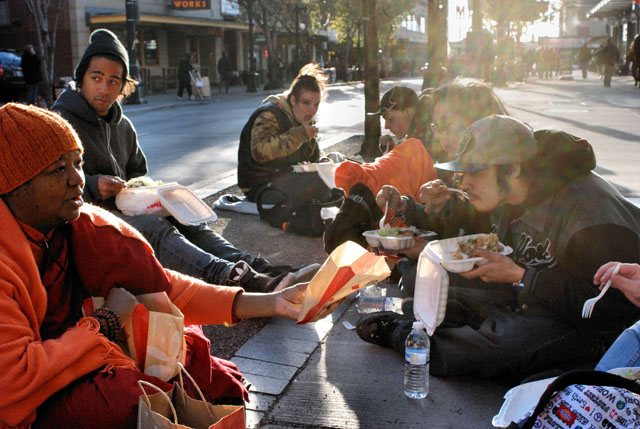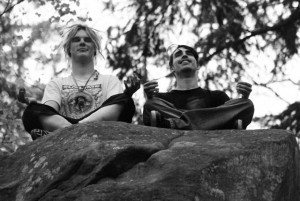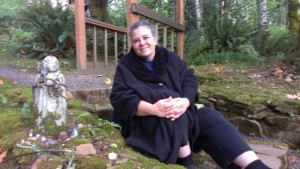How Seattle’s Buddhist Community Can Partner
to Serve the Needs of Low-Income People, Youth
Written by: Polly Trout

When Ven. Pannavati visited Seattle, she bought lunch for homeless youth and ate on the sidewalk with them. Patacara Community Center is to offer similar service.
Photos by: Polly Trout, Katia Roberts
I write to share my vision of creating a Buddhist-oriented café and community wellness center, for low-income people in Seattle.
Patacara Community Center will be a faith-based nonprofit inspired by the teachings and ethics of Buddhism. It will be an opportunity for dharma practitioners from many different traditions to come together in a nonsectarian endeavor and offer service and compassion to those who are suffering.
We will provide healthy, made-from-scratch vegetarian food to those who are hungry in a graceful and peaceful setting, on a donation-only basis. We will have a large classroom for meditation, dharma talks, yoga, tai chi, support groups, and other wholesome activities. We will have a reading room, a small children’s play area, and a community garden.

The Patacara Center could provide meditation space for homeless youth like these, shown meditating in a park in Seattle.
Patacara (pronounced Pah-tah-char-ah) Community Services is named after Patacara, who was one of the first Buddhist nuns. As a young woman, Patacara lost everything. Her husband, children, and parents all died in a series of unexpected and tragic events.
Crazed with grief, she wandered naked and destitute, without family or a home, until the townspeople took pity on her and guided her to where the Buddha was teaching.
He looked at her kindly and said, “Sister, recover your presence of mind.”
Her lucid mind returned and with the Buddha’s help, she began her journey back to wholeness. She eventually became fully enlightened and one of the most respected and beloved teachers of her generation, with a special gift for being able to help people overwhelmed by grief and despair, as she once had been.
Patacara Community Center will be designed to help all participants “recover our presence of mind.”
My vision for the Patacara Community Center has grown out of my work mentoring and educating young adults who have experienced poverty, trauma, homelessness, and marginalization. Eleven years ago I founded Seattle Education Access (SEA), a nonprofit that provides higher education advocacy and opportunity to young people struggling to overcome poverty and adversity throughout King County.
Today, SEA is a thriving organization with a staff of nine serving 600 students a year throughout King County. I continue to serve there as a program manager and it is wonderful work; I especially enjoy mentoring young people, volunteer management, and community building.

Abandoned homes in Seattle, like this one, perhaps could provide housing for homeless youth.
However, in the past few years, I have become increasingly concerned about some community needs that SEA cannot meet because of its mission focus, and have been reflecting on how a new nonprofit, grounded in the insights and ethics of dharma practice, might fill some unmet needs in the community.
Last December, when Venerable Pannavati visited Seattle, she stopped by Seattle Education Access and visited with some of my students and also some young people that my good friend and dharma sister Katia Roberts mentors. We had an exciting conversation about her work with homeless youth in North Carolina, and the connection between practice and service.
Patacara Community Center will be for people of all ages, but rises out of a special concern for young people and young families who are hungry for meaning and connection, and who are suffering from alienation and despair. They need more opportunities to heal and grow in empowering community environments where they can be encouraged and mentored by people who have made it to a safe harbor, and who can model joy, peace, loving kindness, equanimity, compassion, and wisdom.
When Venerable Pannavati was in Seattle she sat with youth on a downtown Seattle sidewalk, feeding them and being present with them. Wouldn’t it be wonderful if we had a whole center where we can do that together?
Roberts teaches homeless youth to meditate in parks. Wouldn’t it be wonderful if we had a center for that, with soup, for when it is cold and rainy?

Author Polly Trout, at Cloud Mountain Retreat Center.
Every day, I walk past abandoned buildings and homeless people, and wonder how we might do more with the resources available to us, just by fostering greater creativity, leadership, vision, wisdom, and interdependence.
In my work I have the great privilege to know many young people who are brilliant, idealistic, and skillful. They want to make positive changes in the community, and they are choosing to live simply rather than sell out. They have time and energy to volunteer, and they also have unmet needs. They are struggling to heal from trauma and marginalization, and to develop themselves spiritually, intellectually, and morally.
These young people cannot afford to pay for many learning opportunities that would help them in their journey. Even when events like meditation are offered for free, they are not always offered in a way that is deeply sensitive to issues of class and race, and well-meaning people sometimes accidentally make these activities feel inaccessible to people coming from a background of poverty and exclusion.
At the same time, there are many dharma practitioners in Seattle who want very much to give generously and reduce suffering, but are not sure how to do so skillfully.
In California and New York there are visible and vigorous Buddhist, faith-based service organizations, but not here in Seattle. But if we work together, we can make this happen.
At Patacara, people of all faiths will be welcome and dharma teachings will be gently offered, but always optional.
The Buddha taught us to care for those who are suffering with loving kindness and generosity. It would be wonderful for us to work together, to show Seattle the depth and integrity of our compassion, by creating a beautiful, gracious space where we can live our values in service to those who are suffering.
I hope you will join me in making this vision a reality. Our volunteer team is coming together, and I am very grateful that Guru Dorje, program manager of Learning Center North at Shoreline Community College; and Genjo Marinello, abbot of Seattle-based Zen center Chobo-ji, have volunteered to serve on our board of directors. Venerable Pannavati and Bernie Glassman have both agreed to serve on our advisory board.
Right now, our greatest needs are:
- Volunteers for our board of directors, advisory board, and circle of generosity
- Financial donations
Once we have established ourselves as a tax-exempt charity and raised $200,000 in a capital campaign, we will be able to sign a lease on a “fixer-upper” in a low- income neighborhood that does not already have a food program, restore the property beautifully, and open our doors for service.
Patacara Community Center will primarily run on volunteer labor, but we will have some paid staff to provide ethical leadership, sound management, and volunteer supervision. If you would like to participate, please contact me at pollytrout@yahoo.com or 206-465-6342.
